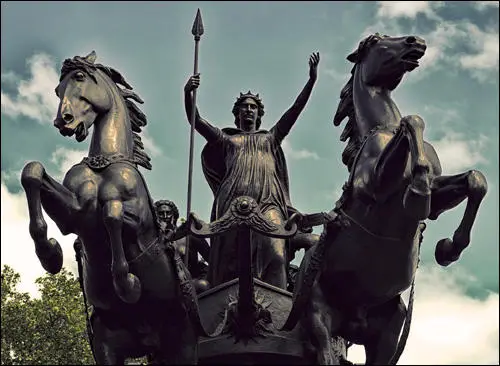Boudica's Revolt
Boudica was married to King Prasutagus, the king of the Iceni tribe in Norfolk. Prasutagus was loyal to the Roman invaders but when he died in in AD 60 he left his kingdom jointly to his two daughters and Nero, the Roman emperor. Nero refused to share power with Prasutagus' daughters and orders were given to the Roman Army to take the kingdom by force. "Kingdom and household alike were plundered by the Roman army. His widow Boudica was flogged and their daughters raped." (1) The Romans believed that they had the right to rape the women of any group that resisted their rule. The property and possessions of all the chief tribal families were seized. (2)
The historian, Cassius Dio, was impressed by the abilities of Boudica. "The rousing of the Britons, the persuading of them to fight against the Romans, the winning of the leadership and the command throughout the war - this was the work of Boudica, a woman of the British royal family who had uncommon intelligence for a woman... When she had collected an army about 120,000 strong, Boudicca mounted a rostrum... She was very tall and grim... and her voice was harsh. She grew her long auburn hair to the hips. Taking a spear too to add to her effect upon the entire audience." (3)
It was claimed that Boudica told her troops: "I am not fighting for my kingdom and wealth. I am fighting as an ordinary person for my lost freedom... Consider how many of you are fighting - and why. Then you will win this battle, or perish. That is what I, a woman, plan to do! - let the men live in slavery if they will." (4)

Boudica's army attacked Roman settlements at London, Colchester and St Albans. Roman historians claim that Boudica's army killed at least 70,000 people in these attacks. "They could not wait to cut throats, hang, burn and crucify." At the time the Roman soldiers were involved in a military campaign in Wales. As soon as Gaius Suetonius Paulinus, the Roman governor, heard about the rebellion he rushed his troops back to England.
We do not know where the battle between Boudica and Paulinus took place. Graham Webster, the author of Boudica: The British Revolt Against Rome (1978) points out that Boudica's troops "lacked organisation, discipline and equipment" and that the "best body protection a man could acquire was a leather jerkin, heavily greased to turn a swordblade, with toughened strips or patches to the shoulders and other vulnerable parts". (5) Julius Caesar claimed that they usually went into battle naked: "all the Britons dye their bodies with woad, which produces a blue colour and gives them a wild appearance in battle." (6)
Roman historians tell us that Paulinus told his troops: "Disregard the empty threats of the natives! In their ranks, there are more women than fighting men... Just keep in close order. Throw your javelins, and then carry on: use shields to push them over, swords to kill them." (7)
Suetonius claims that the Romans had an army of about 10,000, while Boudica had 230,000 soldiers. "The Romans took up a position in a defile, with a plain in front and dense woodland behind. Boudica's tribesmen entered the plain, drawing up their wagons at the back, together with the women and children, as though in a grandstand. Lured into attack, the Britons were met first with a shower of javelins, and then by a disciplined assault. Hemmed in by the carts, there was a terrible slaughter of the tribespeople." It is claimed that 80,000 Britons and 400 Romans were killed during the battle. (8)
Boudica managed to escape but according to Tacitus, when she realised that she would be unable to defeat the Romans, she committed suicide by taking poison. Cassius Dio suggested her death might have been caused by sickness. However, it has been pointed out that the sickness might have been caused by taking poison. (9)
Primary Sources
(1) Tacitus, The Annals of Imperial Rome (c. AD 118)
Prasutagus, king of the Iceni... made the emperor co-heir with his own two daughters. Prasutagus hoped by this submissiveness to preserve his kingdom and household from attack when he died. But it turned out otherwise. Kingdom and household alike were plundered by the Roman army. His widow Boudicca was flogged and their daughters raped.
(2) Boudicca, speech to her troops before fighting the Roman army, quoted by Tacitus in The Annals of Imperial Rome (c. AD 118)
I am not fighting for my kingdom and wealth. I am fighting as an ordinary person for my lost freedom... Consider how many of you are fighting - and why. Then you will win this battle, or perish. That is what I, a woman, plan to do! - let the men live in slavery if they will.
(3) Cassius Dio, Roman History (c. AD 215)
The rousing of the Britons, the persuading of them to fight against the Romans, the winning of the leadership and the command throughout the war - this was the work of Boudicca, a woman of the British royal family who had uncommon intelligence for a woman... When she had collected an army about 120,000 strong, Boudicca mounted a rostrum... She was very tall and grim... and her voice was harsh. She grew her long auburn hair to the hips. Taking a spear too to add to her effect upon the entire audience.
(4) Tacitus, The Annals of Imperial Rome (c. AD 118)
The Britons enjoyed plundering and thought of nothing else. Bypassing forts and garrisons, they made for where loot was richest and protection weakest. Roman deaths at (Colchester, London, St. Albans) are estimated at 70,000 ... They could not wait to cut throats, hang, burn, and crucify... Suetonius Paulinus decided to attack without further delay.
